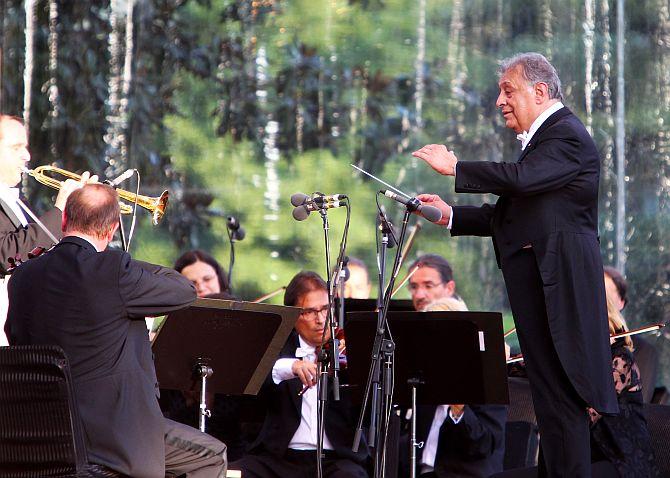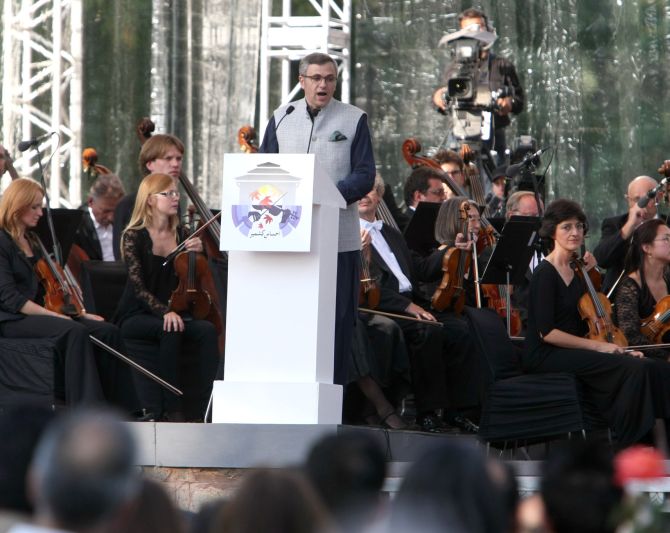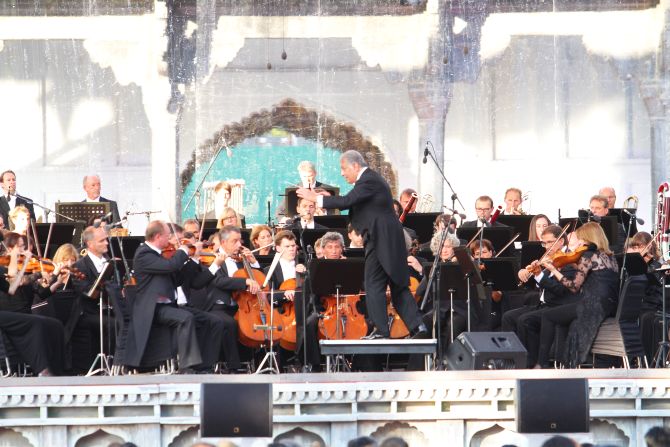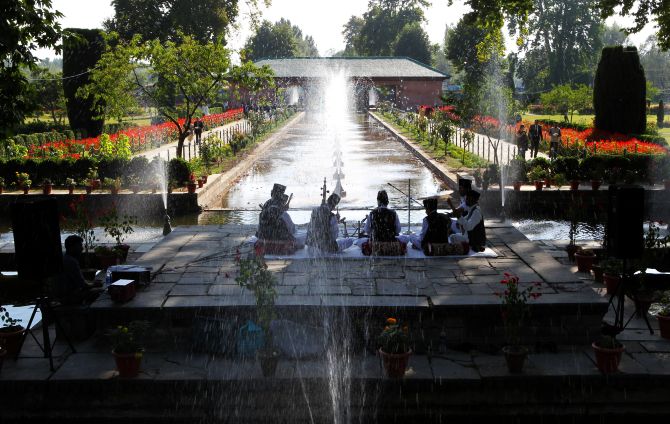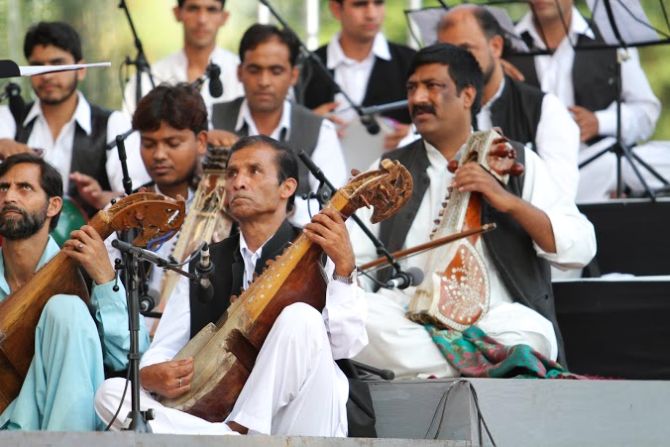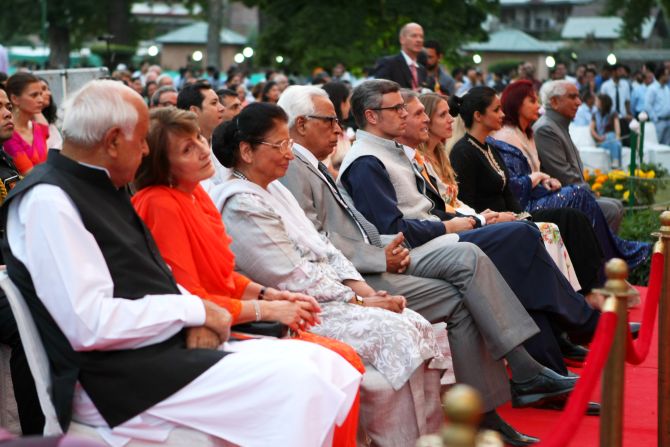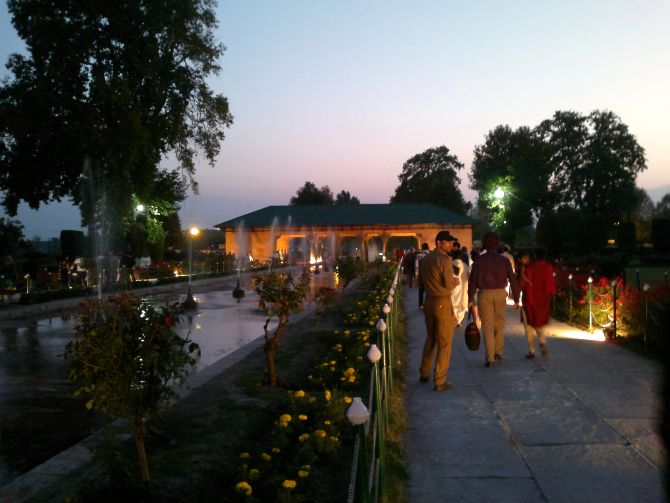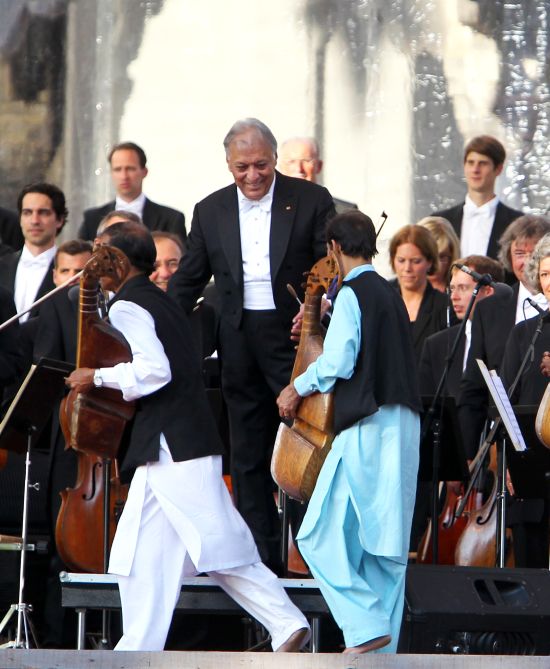 | « Back to article | Print this article |
Music, beauty, history: It is here, it is here
Vaihayasi Pande Daniel, who attended Zubin Mehta’s mesmerizing concert at the picturesque Shalimar Bagh in Srinagar, describes those enigmatic moments when harmony returned to the heaven on earth, Kashmir.
The azaan call seems to sound more passionate in Kashmir.
Perhaps more emotional.
Its sound, spilling out from dargahs, mosque after mosque, stands out in the stillness of its luminous scenery.
Before Maestro Zubin Mehta’s first concert in Kashmir, along with the Bayerisches Staatsorchester began, the quiet gardens at Shalimar Bagh, on the Dal lake, rang with the muezzin call from a nearby mosque, at close to five.
As his concert closed, around the seven, another Islamic call to prayer sounded.
The resonance of the azaan quite starkly brought out the history of the moment; of what was happening at this proud spot.
And showed up the remarkable contrast -- to have stirring pieces of Tchaikovsky and Beethoven bookended by the pukaar of the azaan. You don’t need to pinch yourself to realise this is a Zubin Mehta-conducted evening, happening in Kashmir.
Please click NEXT to read further...
Music, beauty, history: It is here, it is here
The politics surrounding the concert and the views about whether it should happen or not, had to be necessarily left at the gates of the Shalimar Bagh, as the sun set on this September day.
Music ruled within the perimeter of these sumptuous Mughal gardens, spread across 12.4 hectares that was created by Emperor Jehangir for his wife Nur Jehan in 1619. Gardens that have seen such an interesting passage of time and winds of history -- the arrival of Jehangir’s summer court year after year, visitors from all over Central Asia, including Baltistan, Punch, Gilgit Agency, Tibet, Russia, and the Europeans who often stayed at Shalimar’s pavilion as guests of the Kashmiri king.
Said German ambassador to India, Michael Steiner, as he opened the concert: “The distance between Munich and Srinagar is 7,076 kilometres. Today we have brought the distance to zero!”
Lots of clapping…
“Germans and European cultural heritage bows to Kashmir.” More clapping… “To its heritage. To its beauty. Its difficult reality.”
Referring to a line from a poem by the 16th century Kashmiri poet Habba Khatoon, he quoted: “Many nightingales entered the garden
And they had their play
The flowers left the garden
To make way for the nightingales”
He ended his vote of thanks with, “Most of all I thank you the Kashmiris.”
Please click NEXT to read further...
Music, beauty, history: It is here, it is here
The chief minister of Jammu and Kashmir, Omar Abdullah, began with the famed couplet of Sufi musician and poet Amir Khusrau which is inscribed on the wall of a pavilion in the gardens:
Gar firdaus bar roo-e zameen ast,
Hameen ast-o hameen ast-o hameen ast
… If there is heaven on earth, it is this, it is this, it is this…
He added that the couplet symbolises the reality as well as the irony of Kashmir today. “The reality is this god-given beauty. The irony is how man has conspired to convert this heaven, into often time, for the want of a better word, a living hell.”
To a huge applause he pointed out how the Bagh was echoing with music after a gap of 25 years.
Please click NEXT to read further...
Music, beauty, history: It is here, it is here
Omar recalled how many years ago, he was sitting at a concert in front of the Taj Mahal and wondering to himself if he would ever again be able to witness a musical event taking place in front of one of Kashmir’s Mughal “treasures”. “Today that dream of mine has become a reality.”
After many months and “not a few sleepless nights” he says the maestro’s dream to have a concert in Kashmir came to life. He is not sure what the German ambassador feels or Mehta, but inspite of the difficult realisation of this effort, he passionately said he would do it once again all over tomorrow.
Please click NEXT to read further...
Music, beauty, history: It is here, it is here
Zubin, whose wife Nancy was sitting in the audience in a midnight blue sari, beamingly arrived on stage and said, cracking a huge grin: Bahut khush hua (I am very happy)!” Enormous cheering.
He mused: “I have waited and dreamt for this moment all my life and every person on the sub-continent will agree that this is where it should be.” He said next time he would like to perform a concert for every Kashmiri and not just the 2,000 present today, and it would be held in a stadium!
A love letter to Kashmir kicked off the concert -- a specially worked out fusion piece, rehearsed vigorously in the few hours run up to the concert, between Mehta and his captivating Baton, the Bavarians and the long-haired, suave Kashmir-born Abhay Rustom Sopori (son of Kashmiri music legend Pt Bhajan Sopori) and his assemblage.
It may, or may not, have been the most technically perfect piece of music. But given its deep emotional chords, and the picture perfect backdrop against which it was being played, it seemed like the most delightful composition of fusion one had ever listened to.
Please click NEXT to read further...
Music, beauty, history: It is here, it is here
As the Bavarians, attired in crisp black and white, sitting on black-cloth wrapped chairs, began thrilling synchronised arm-work on their shiny violins, cellos and trombones, they spoke to the 40-odd-member Kashmiri troupe, also clad in white and black, strumming traditional Kashmiri instruments ranging from the santoor to the matka, rabab, tumbak and saringi. Enchantment happened.
There after Zubin and the orchestra got down to a more orthodox classical repertoire.
And as the sweet notes of Ludwig van Beethoven’s Leonore Overture No 3 in C Major, floated out from in front of the Diwan-fa-Khas, the best variety of peace washed over the green.
Please click NEXT to read further...
Music, beauty, history: It is here, it is here
The audience, not always attentive, was a mix of local and Delhi politicians, including former chief minister Farooq Abdullah, diplomats, Kashmir government bureaucrats, Delhi-wallahs and socialites, families of Mumbai Parsi industrialists like the Wadias and the Godrejs. A lot of Kashmiri was being spoken.
Plenty of music enthusiasts were bowled over by the purity of the music; keeping time, rocking to the melody. Cellphones were held up for picture after picture and to capture video clips.
Please click NEXT to read further...
Music, beauty, history: It is here, it is here
Arrangements for the concert were efficient and the tightest, more so than probably anywhere before in India for a 90-minute music show.
Police and CRPF lined the route along the Dal lake for miles, checking passes and invitations at intervals. Guests were bussed from the parking lot -- though many a VIP disdainfully insisted on getting back into his car after viewing the dusty, ramshackle vehicles -- to the gates of Shalimar Bagh.
The Bagh is in the shadow of a range of towering hills and its acres are covered with beds of a rainbow of flowers, maple trees, fountains, ponds, manicured hedges and historic gates or doors.
Please click NEXT to read further...
Music, beauty, history: It is here, it is here
Sapori and his crew, along with the German musicians, closed the concert as well, with the audience humming along. Again the beauty -- hameen ast, hameen ast.
A happy but exhausted Zubin in ending said in his inimitable Bombay Parsi Hindi: “Kashmiri music ke saath shuru ho gaya, Kashmir music ke saath ghar jayega.”
TOP photo features you missed last week
Click on MORE to see another PHOTO features...
